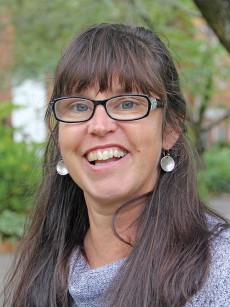NAS Research Colloquium: “Can Climate Change Be A Strategic Opportunity? Karuk Tribe’s Climate Vulnerability Assessment,” Kari Noorgard (Sociology)
Feb 2, 2016, 12:00 pm – 1:30 pm
Many Nations Longhouse

ABSTRACT: Climate change poses significant threats to Karuk traditional foods and cultural use species and tribal political status on the one hand, and on the other represents the greatest material and symbolic threat settler-colonial society has encountered to date. Climate change brings major challenges to the Karuk Tribe as precipitation patterns change, drought increases and high intensity wildfires become more frequency and severe. In particular, the combination of climate change and past non-Native forest management activities have created landscape conditions that could be completely devastating with high intensity fire. These changing climactic conditions affect specific Karuk tribal traditional foods and cultural use species, create infrastructure vulnerabilities to specific tribal programs and pose broader implications for long term management authority and political status. On the other hand, the untenable nature of non-Native management forest practices is now becoming widely visible to non-Native land managers and agencies. Interest in traditional ecological knowledge and traditional indigenous management practices is growing in the face of climate change. Climate change has brought a shifting policy terrain where new mandates and organizational structures have begun to emerge. Can these two factors provide a strategic opportunity for the return of Karuk use fire to the landscape? The Karuk Tribe’s climate vulnerability assessment is an attempt to use the present political moment as a tactical opportunity to return traditional management practices to the land.
BIO: Professor Norgaard (B.S. Biology Humboldt State University 1992, M.A. Sociology Washington State University 1994, PhD Sociology, University of Oregon 2003) is Associate Professor of Sociology and Environmental Studies at University of Oregon. Dr. Norgaard trained as a postdoctoral fellow in an interdisciplinary IGERT Program on Invasive Species at University California Davis from 2003-2005 and from there joined the faculty as Assistant Professor at Whitman College in Walla Walla, WA from 2005-2011. She joined the University of Oregon faculty in 2011. Over the past ten years Dr. Norgaard has published and taught in the areas of environmental sociology, gender and environment, race and environment, climate change, sociology of culture, social movements and sociology of emotions. She currently has two active areas of research: 1) work on the social organization of denial (especially regarding climate change), and 2) environmental justice work with Native American Tribes on the Klamath River.
Both of these areas of scholarship have been nationally recognized through the award of research grants, speaking invitations, and coverage of research by high profile media outlets including the Washington Post, National Geographic, British Broadcasting System, and National Public Radio. Her book Living in Denial: Climate Change, Emotions and Everyday Life came out with MIT Press in the Spring of 2011. Norgaard is the recipient of the Pacific Sociological Association’s Distinguished Practice Award for 2005.
Event is free and open to the public. Bring your own lunch.